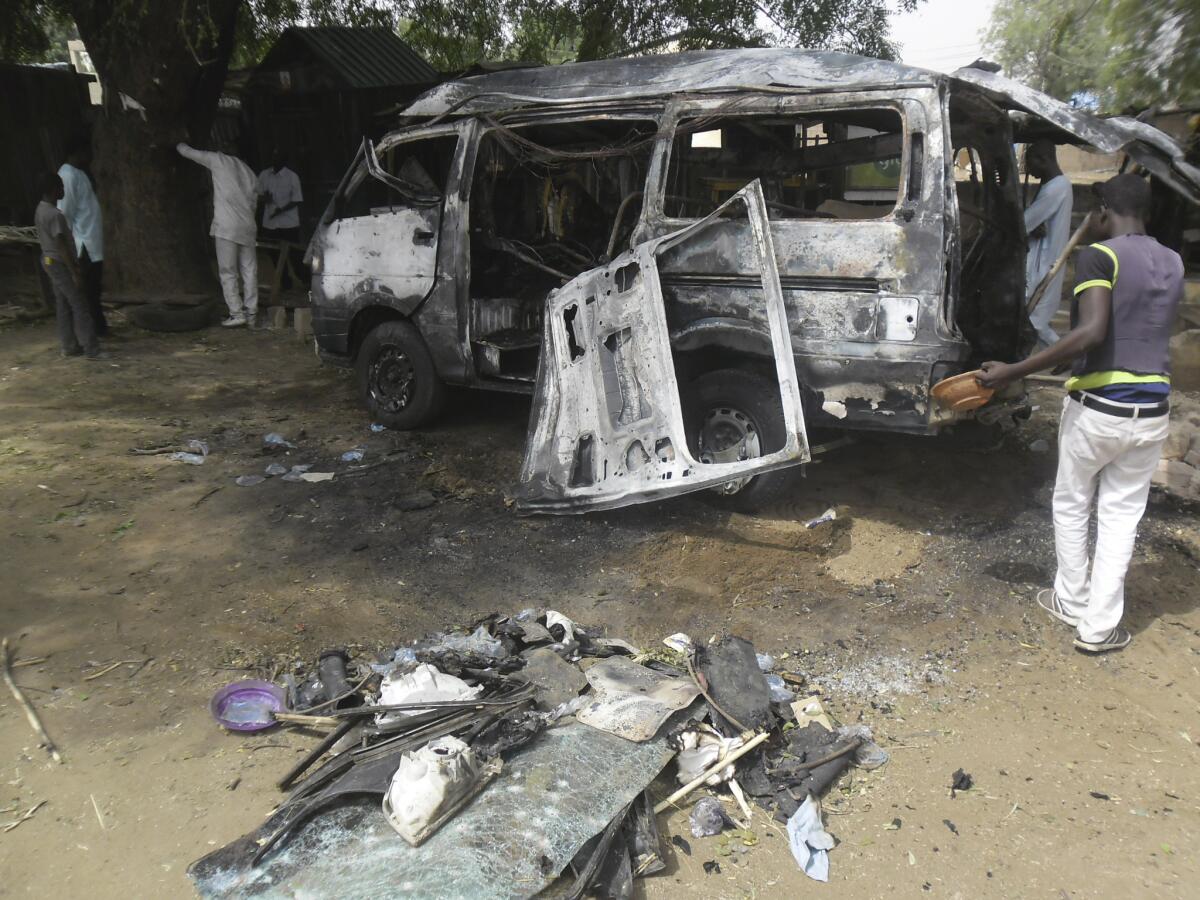Attacks in Nigeria target buses ahead of election

- Share via
Reporting from Johannesburg, South Africa — Just over a month before an election that militants from Boko Haram have vowed to disrupt, suicide bombers killed dozens of people Tuesday in two attacks on buses in northern Nigeria.
A morning blast in the northeastern town of Potiskum and afternoon attack in Kano marked three suicide attacks on civilian targets in as many days. Dozens of other people were injured, many seriously.
There were conflicting reports on the number killed in Tuesday’s attacks, with some saying as many as 22 people died in Potiskum and at least 12 in Kano.
The attacks were chilling: On Tuesday, a bomber waited for a bus on the outskirts of Potiskum, in Yobe state, to fill up with passengers before detonating the blast on the Kano-bound bus. The explosion injured dozens, a security source told Reuters news service.
-------------
FOR THE RECORD:
2:15 p.m.: An earlier version of this post said Potiskum is the capital of Yobe state. Damaturu is the capital.
-------------
The Kano explosion hit one of the city’s biggest bus stations about 3.40 p.m. The local Premium Times newspaper reported two suicide bombers carried out the attack. Kano state Commissioner of Police Ibrahim Idris told the paper 12 people died, including the two bombers.
No group claimed responsibility for the attacks, which resembled many previous strikes by Boko Haram, often using girls and young women as suicide bombers.
Two days earlier, a girl who witnesses said was about 10 years old approached a cellphone market before a bomb hidden in her clothing exploded, killing her and four other people.
One witness, Musa Ayuba, told Reuters that the bus bomber was a teenage girl.
The blasts come after a video statement released last week by Boko Haram leader Abubakar Shekau threatened to attack the elections, which have already been delayed by six weeks due to security concerns. The terror group opposed elections, he said, because they were un-Islamic and people could only be governed by God, not politicians.
Boko Haram opposes the Nigerian government, democracy, taxes, secular education, soccer, banking and other aspects of Western life -- although, like Islamic State, it has recently started to use social media, including YouTube and Twitter, to spread its message.
Nigerian President Goodluck Jonathan, facing an uphill battle to win reelection, pledged Monday that Shekau would be captured before the March 28 vote.
The opposition All Progressives Congress scoffed at his prediction. Its spokesman, Malam Garba Shehu, claimed in a statement Monday that the government was planning to unveil a “fake” Shekau to convince voters of the Jonathan administration’s success in fighting terrorism.
Shehu accused the government of plans to coach the fake terrorist to claim an affiliation with the APC’s presidential candidate, Muhammadu Buhari.
Boko Haram has lost several key northeastern towns recently, hammered by a regional force that includes troops from Chad, Cameroon and Niger. But the Potiskum attacks suggest that even if it loses much of the territory it seized this past year, it will retain the capacity to launch terrifying bomb attacks on the soft civilian targets it prefers: markets, bus stations, beer halls and other crowded places.
Nigerian air force planes continue to bomb Boko Haram targets near Gwoza, Bama and in the Sambisa forest, military spokesman Chris Olukolade said Monday. Olukolade told Nigerian media that many Boko Haram terrorists had been killed in the bombings.
Olukolade said Saturday that Nigerian and foreign forces regained control of the northeastern town of Baga, and that many militants drowned in nearby Lake Chad while fleeing the military attack. He said the terrorists laid about 1,500 land mines on the roads into the town.
The military released photographs of sophisticated weapons it claimed to have seized, and of an alleged male terrorist dressed in female clothing. Olukolade said many Boko Haram members tried to escape dressed as women.
Boko Haram attacked Baga last month, killing hundreds of people in one of its deadliest assaults.
Follow @robyndixon_LAT on Twitter for news out of Africa
More to Read
Sign up for Essential California
The most important California stories and recommendations in your inbox every morning.
You may occasionally receive promotional content from the Los Angeles Times.












